2023届高考英语语法点梳理:名词课件(36张PPT)
文档属性
| 名称 | 2023届高考英语语法点梳理:名词课件(36张PPT) |  | |
| 格式 | zip | ||
| 文件大小 | 151.1KB | ||
| 资源类型 | 教案 | ||
| 版本资源 | 通用版 | ||
| 科目 | 英语 | ||
| 更新时间 | 2022-07-27 18:01:45 | ||
图片预览

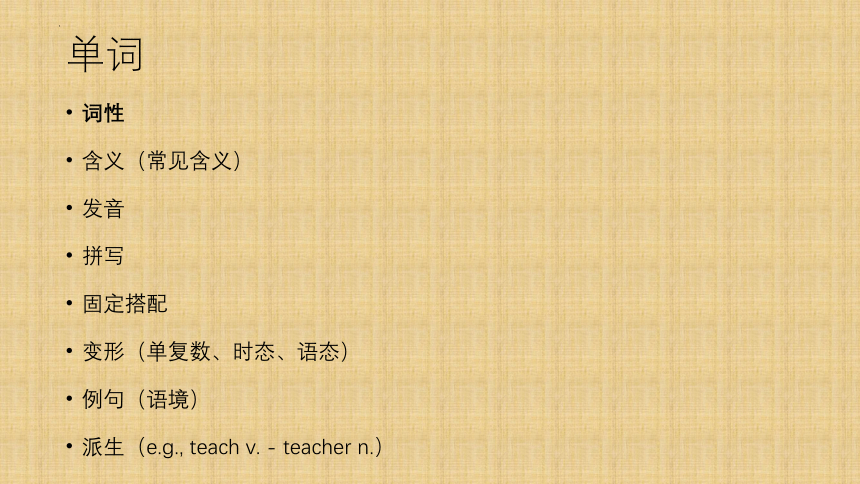


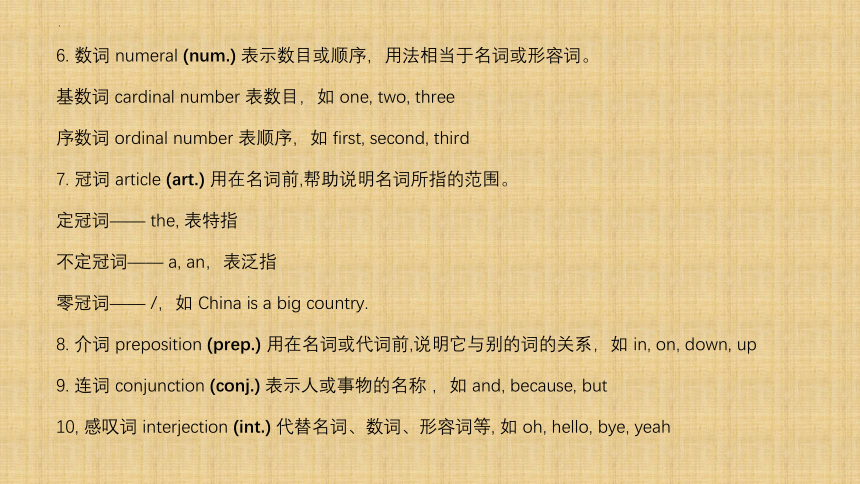
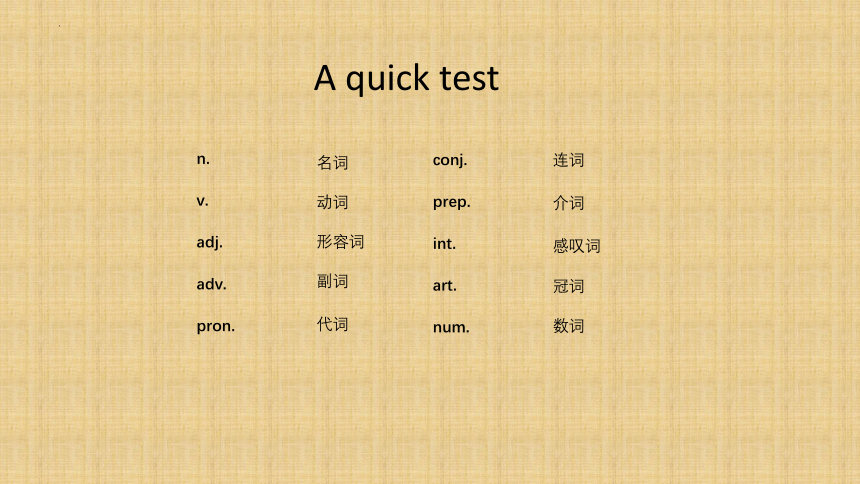
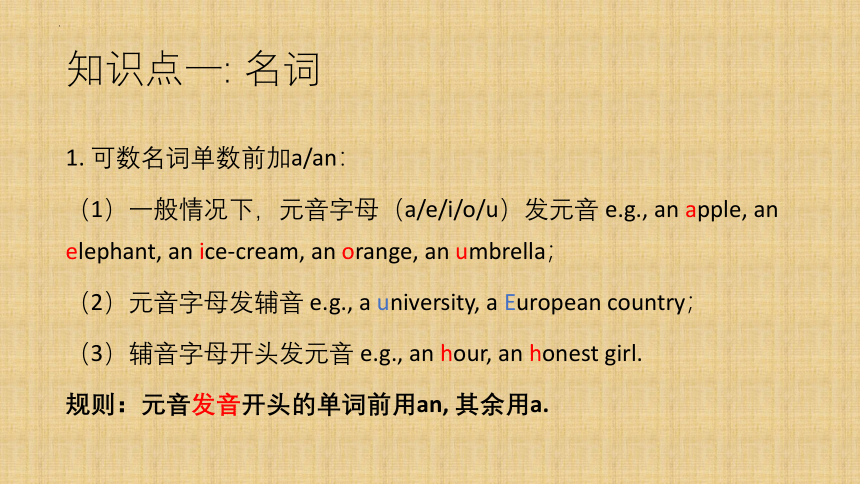
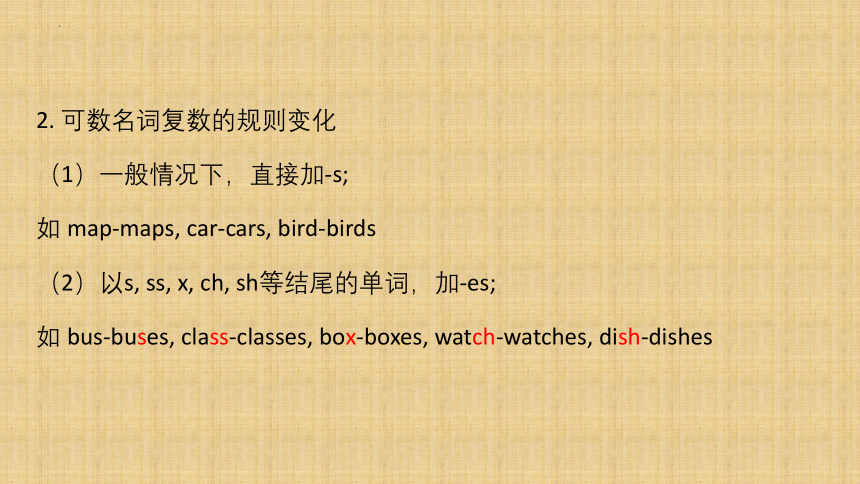
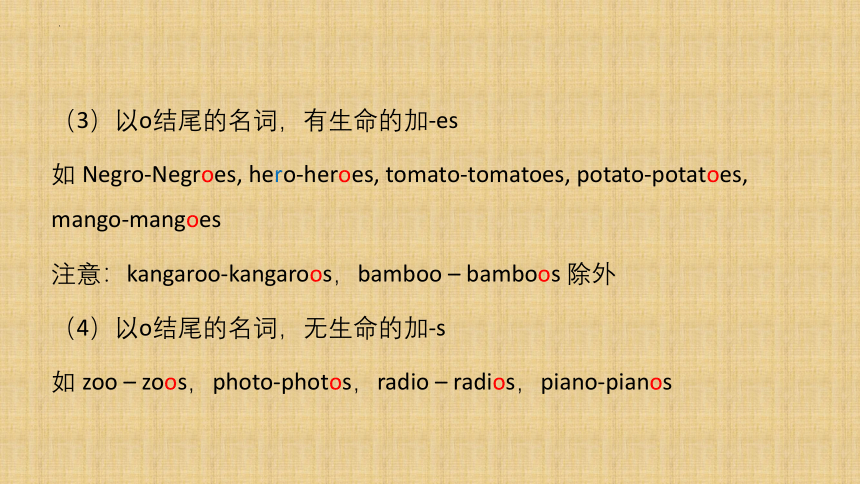
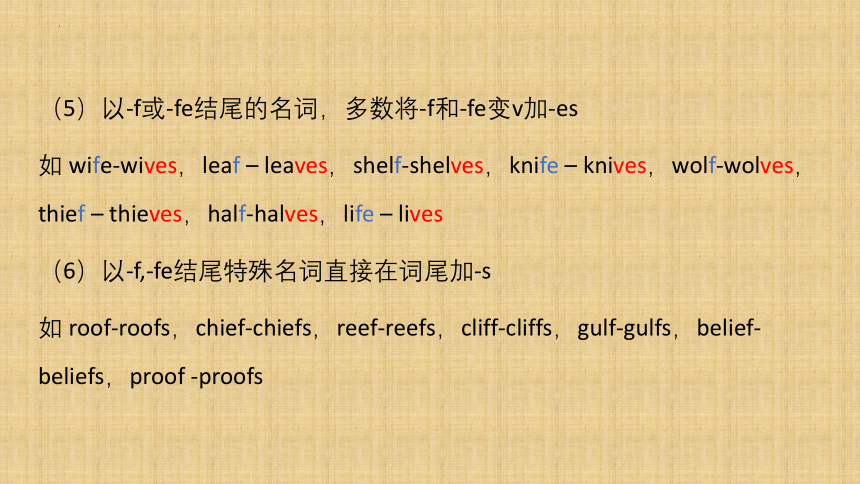
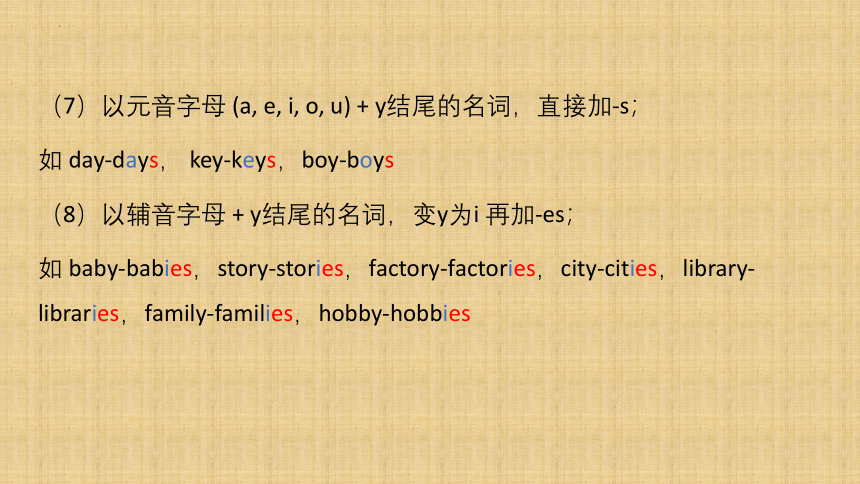
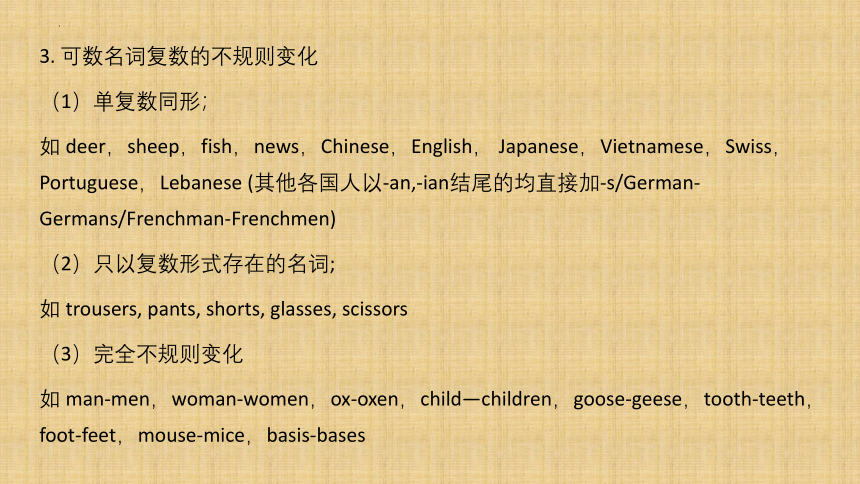
文档简介
(共36张PPT)
专题一:单词
单词
词性
含义(常见含义)
发音
拼写
固定搭配
变形(单复数、时态、语态)
例句(语境)
派生(e.g., teach v. - teacher n.)
词性
1. 名词 Nouns (n.) 表示人或事物的名称。
可数名词,如 box(es), tree(s), apple(s),掌握名词复数变化规则
不可数名词,如 money, time, power等抽象名词
2. 代词 pronoun (pron.) 具有名词、数词、形容词的作用。
人称代词,如 I, you, they
物主代词,如 my, your, their
反身代词,如 myself, yourself, themselves
指示代词,如 this/these, that/those
不定代词,如 some, all, many
疑问代词,如 what, who, which
3. 形容词 adjective (adj.) 用来修饰名词,表示人或事物的特征。
如 good, sad, high, short
4. 副词 adverb (adv.) 修饰动、形、副等词, 表示动作特征。
如 quickly, very, suddenly, there
掌握常见的形容词和副词的比较级和最高级
5. 动词 verb (v.) 表示动作或状态。
如: Jump, sing, visit
vt.是及物动词,vt. 后必须跟宾语,如 visit a place,只有及物动词才有被动语态![ A place is visited.]
vi.是不及物动词,vi.后不直接带宾语或不带宾语:jump high
掌握动词的规则和不规则变化以及系动词、助动词、情态动词用法
6. 数词 numeral (num.) 表示数目或顺序,用法相当于名词或形容词。
基数词 cardinal number 表数目,如 one, two, three
序数词 ordinal number 表顺序,如 first, second, third
7. 冠词 article (art.) 用在名词前,帮助说明名词所指的范围。
定冠词—— the, 表特指
不定冠词—— a, an,表泛指
零冠词—— /,如 China is a big country.
8. 介词 preposition (prep.) 用在名词或代词前,说明它与别的词的关系,如 in, on, down, up
9. 连词 conjunction (conj.) 表示人或事物的名称 ,如 and, because, but
10, 感叹词 interjection (int.) 代替名词、数词、形容词等, 如 oh, hello, bye, yeah
A quick test
n.
v.
adj.
adv.
pron.
名词
动词
形容词
副词
代词
连词
介词
感叹词
冠词
数词
conj.
prep.
int.
art.
num.
知识点一: 名词
1. 可数名词单数前加a/an:
(1)一般情况下,元音字母(a/e/i/o/u)发元音 e.g., an apple, an elephant, an ice-cream, an orange, an umbrella;
(2)元音字母发辅音 e.g., a university, a European country;
(3)辅音字母开头发元音 e.g., an hour, an honest girl.
规则:元音发音开头的单词前用an, 其余用a.
2. 可数名词复数的规则变化
(1)一般情况下,直接加-s;
如 map-maps, car-cars, bird-birds
(2)以s, ss, x, ch, sh等结尾的单词,加-es;
如 bus-buses, class-classes, box-boxes, watch-watches, dish-dishes
(3)以o结尾的名词,有生命的加-es
如 Negro-Negroes, hero-heroes, tomato-tomatoes, potato-potatoes, mango-mangoes
注意:kangaroo-kangaroos,bamboo – bamboos 除外
(4)以o结尾的名词,无生命的加-s
如 zoo – zoos,photo-photos,radio – radios,piano-pianos
(5)以-f或-fe结尾的名词,多数将-f和-fe变v加-es
如 wife-wives,leaf – leaves,shelf-shelves,knife – knives,wolf-wolves,thief – thieves,half-halves,life – lives
(6)以-f,-fe结尾特殊名词直接在词尾加-s
如 roof-roofs,chief-chiefs,reef-reefs,cliff-cliffs,gulf-gulfs,belief-beliefs,proof -proofs
(7)以元音字母 (a, e, i, o, u) + y结尾的名词,直接加-s;
如 day-days, key-keys,boy-boys
(8)以辅音字母 + y结尾的名词,变y为i 再加-es;
如 baby-babies,story-stories,factory-factories,city-cities,library-libraries,family-families,hobby-hobbies
3. 可数名词复数的不规则变化
(1)单复数同形;
如 deer,sheep,fish,news,Chinese,English, Japanese,Vietnamese,Swiss,Portuguese,Lebanese (其他各国人以-an,-ian结尾的均直接加-s/German-Germans/Frenchman-Frenchmen)
(2)只以复数形式存在的名词;
如 trousers, pants, shorts, glasses, scissors
(3)完全不规则变化
如 man-men,woman-women,ox-oxen,child—children,goose-geese,tooth-teeth,foot-feet,mouse-mice,basis-bases
4. 不可数名词-没有复数形式! 如何量化不可数名词?
(1)数词+量词(普通名词)+ of + 不可数名词,如:
a piece of news 一条消息/一则新闻 a glass of milk 一杯牛奶 a cup of tea 一杯茶 a loaf of bread 一条面包
a bar of soap 一块肥皂 a tin of tobacco 一听/罐烟丝 five bags of rice 五袋大米 two kilos of meat 二公斤肉
half a pound of coffee 半磅咖啡 a quarter of a pound of cheese 四分之一磅奶酪
(2)用some , much , a lot of , lots of , a bit of , a little , little等数量形容词表示。
注意区分
few, a few, many, many a(n), a good/great many, a great/large number of + [c.]n.
little, a little, much, a great deal of, a great/amount of +[u.]n.
a lot of, lots of, plenty of, a large quantity of/large quantities of + [c./u.]n.
Quiz
house exercise child bus
tooth box goose hill
dictionary woman half time
match German fish shoe
policeman shelf panda boy
Japanese bowl wolf deer
Quiz
house houses exercise exercises child children bus buses
tooth teeth box boxes goose goose hill hills
dictionary dictionaries woman women half halves time /
match matches German Germans fish fish shoe shoes
policeman policemen shelf shelves panda pandas boy boys
Japanese Japanese bowl bowls wolf wolves deer deer
高考核心词汇串讲(1)
1. able [ e b( )l] adj.
(1)能够,有能力的;
固定搭配: be able to do sth. 有能力做某事
例句: The older child should be able to prepare a simple meal.
这个大点儿的孩子应该能做顿简单的饭菜。
(2)聪明能干的,精通(某事)的
例句:She is one of the brightest and ablest members of the government.
她是最聪明、最有才能的政府成员之一。
(3)有技能和资质做好的
短语:An able/capable teacher 一位教学能力强的老师
(4)身体健康强壮的
短语: an able/able-bodied seaman 一位健康强壮的水手
高考核心词汇串讲(1)
派生词:
ably adv.巧妙地;精明能干地
-be ably assisted by sb. 得到某人的大力协助
ability n. 能力
-have ability to do sth. 有能力做某事
-to the best of one’s ability (-ies) 尽某人所能
unable adj. 不能胜任的,不会的
- be unable to do sth. 没有能力做某事
disabled adj.丧失能力的,有残疾的
-disabled people=the disabled 残疾人
2. abnormal [ b n m( )l]. adj.
反常的,异常的, 变态的
例句:They thought his behaviour was abnormal. 他们觉得他行为反常。
短语:abnormal weather conditions 异常的天气状况
abnormal psychology 变态心理学
(2)(智力和发展等)不正常的
短语:an abnormal child 畸形儿
an abnormal personality 性格反常
反义词:normal adj. 正常的,标准的;(身心)健康的,(人)普通的
3. aboard [ b d]. adv./prep.
在(船、飞机、火车等)上;上(船、飞机、火车等)
例句:She invited 750 people aboard the luxury yacht. [prep.]
她邀请了750人登上这艘豪华游艇
It took two hours to load all the people aboard. [adv.]
用了两个小时才让所有的人上了船。
辨析:
(1) board vt. 上(船,飞机,车)
The passengers are boarding the plane now. 乘客现在正在登机。
(2) abroad [ br d] adv.在国外,到国外
Study/work/travel abroad 到国外学习/工作/旅游
4. absent [ bs nt]. adj./prep./v.
缺勤的,缺席的;
固定搭配:be absent from (a place)
例句: He has been absent from his desk for two weeks.
他已经两个星期没来了。
短语:absent from work 矿工;缺勤
(2) 心不在焉的,出神的;
固定搭配:absent-minded
(3) 不与子女一起住的
短语:an absent father 一个缺席的父亲
5. Absorb [ b z b; b s b] v.
vt. 吸收(液体、气体等);
例句:Plants absorb carbon dioxide from the air and moisture from the soil.
植物从空气中吸收二氧化碳,从泥土中吸收水分。
(2) vt. 吸取(光、热等能力);
例句:Black walls absorb a lot of heat during the day.
黑色墙壁在白天吸收大量的热。
(3) vt. 使并入,纳入;
例句:City schools were absorbed into the countywide school district.
市立学校被并入了郡学区。
(4) vt. 使缓冲
例句:Steel barriers can bend and absorb the shock.
铁栅栏会弯曲并吸收冲击力。
(5) vt. 理解,掌握(信息);
例句: Too often he only absorbs half the information in the manual.
通常,他对手册里的信息只是一知半解。
短语:absorb knowledge 吸取知识
(6) vt. 使全身关注,使专心;
例句:English absorbs her more than other subjects.
英语比其他学科更让她全神贯注。
短语:be absorbed in sth. (因感兴趣)专心致志的
例句:She is absorbed in computer science. 她对计算机科学全神贯注。
(7) vt. 承担(变革、影响、费用等);
例句:The banks would be forced to absorb large losses.
这些银行将被迫承担那些巨大的损失。
(8) vt. 花掉(大量金钱),耗费
例句:It absorbed vast amounts of capital that could have been used for investment.
它消耗掉了原本可以用作投资的大量资本。
6. abundant [ b nd nt] adj. + [c./u. n.]
大量的,丰富的,充足的(more than enough)
例句:Our country has a vast territory and abundant resources.
我国土地辽阔, 资源丰富。
例句:There is an abundant supply of cheap labour.
有丰富的廉价劳动力供应。
近义词:plentiful adj. 丰富的
7. Abuse [ bju s] [u.n] / [ bju z] v.
n. 虐待;
短语:child abuse 虐待儿童
sexual and physical abuse 性虐待和肉体摧残
(2) n. 辱骂;
例句:I shouted abuse as the car sped off.
当车加速离去时,我在那里破口大骂。
(3) n. 滥用;
drug abuse 药物滥用; 毒品滥用 abuse of power 权力滥用
(4) vt. 虐待;
例句:Janet had been abused by her father since she was eleven.
詹妮特自从11岁起就被她的父亲虐待。
(5) vt. 侮辱;
例句:He alleged that he was verbally abused by other soldiers.
他声称他被其他士兵们口头侮辱了
(6) vt. 滥用;
例句:He showed how the rich and powerful can abuse their position.
他揭露了有钱有势的人会如何滥用他们的地位。
派生词:abusive adj. 辱骂的,侮辱的;凌辱的,虐待的;受虐待的;舞弊的,不法的;滥用的
abusive language 侮辱性的话语 violent and abusive (形容人)残暴恶毒的
8. academic [ k dem k] adj./n.
adj. 学术上的
短语:academic standards 学术水平 academic approach 学术方法(和practical or technical skills 相对应)
(2) adj. 学校的
短语:academic year 学年
academic performance/achievement 学业成绩
(3) adj. 学习好的
短语:less academic children 学习不太好的学生
(4) adj. 空谈的
例句:Who wants to hear about contracts and deadlines that are purely academic
谁想听那些完全不切实际的合同和最后期限呢
(5) [c.] n. 学者 - academics
例句:He was a respected academic and above suspicion.
他是一位受敬重的学者,不能受怀疑。
派生词:academy [c.]n. academies 专科院校;研究院,学会;(美国的)私立学校;(苏格兰的)中等学校
9. access [ kses] n./v.
n. 进入手段,进入圈
固定搭配:have access to 使用;接近;可以利用
例句:Only policemen have access to the house.
只有警察才能进入这幢房子。
(2) n. 使用权
例句:The hospital gives patients access to their medical records.
医院给病人们使用自己病历的权利。
(3) n. 接触的机会
例句:He was not allowed access to a lawyer.
他未被允许接触律师。
(4) n. 入口,通道
例句:Does the hotel have wheelchair access
这家旅馆有轮椅通道吗?
(5) vt. 获取(尤其电脑信息)
例句:You've illegally accessed and misused confidential security files.
你已经非法获取并盗用了机密文件。
派生词:
accessible adj.易接近的;可进入的;可理解的
例句:The centre is easily accessible to the general public.
该中心对于广大公众来讲很便利。
accessibility n.
短语:the easy accessibility of the area
该地区的交通便利性
10. accident [ ks d nt] n.
(1) 交通事故,车祸;
短语: a car accident
(2) (不幸的)意外遭遇,不测事件;
例句:5,000 people die every year because of accidents in the home. 每年有5千人死于家庭意外事故。
(3) 意外,偶然的事
固定搭配:by accident 偶然
派生词:accidental adj. 意外的;偶然的;附属的;临时记号的
accidentally adv.意外地;偶然地
11. accomplish [ k mpl ] vt. 完成,实现
例句:If we'd all work together, I think we could accomplish our goal.
如果我们齐心协力,我想我们能实现我们的目标。
短语:accomplish nothing 一事无成;一无所成
近义词:accomplish a goal/an aim = achieve/reach a goal
派生词:
accomplished adj. 完成的;熟练的,有技巧的;有修养的;有学问的
短语:an accomplished painter 一位技艺精湛的画家
accomplishment n. 成就,成绩;技能,才艺;完成,实现
例句: It‘s an amazing accomplishment. 这是一项了不起的成就。
12. accuse [ kju z] vt.
指责;
固定搭配:
accuse sb. of sth./doing sth. sb. be accused of sth. (被动语态) =sb. stands accused of sth. 因为某事指责某人
例句: My mom was really upset because she was accusing her of having an affair with another man. (改写)
我妈妈真的很难过,因为他指责她和另一个男人有暧昧关系。
(2) 指控 (法律层面)
例句:Her assistant was accused of theft and fraud by the police.
她的助手被警方指控偷窃和诈骗。
派生词:
(the) accused 被告 – accuser 原告
accusation n.控告,指控;谴责
13. accustom [ k st m] vt.
使习惯于,使适应于
固定搭配:accustom oneself to sth.
例句: She tried to accustom herself to the tight bandages.
她尝试着使自己习惯那些紧绷的绷带。
派生词:accustomed adj.习惯的;适应的
固定搭配:be accustomed to sth./doing sth.
例句: She is accustomed to having eight hours' sleep a night.
她习惯每晚睡八个小时。
例:My eyes were becoming accustomed to the gloom.
我的双眼逐渐适应了这种昏暗。
14. ache [e k] v./n.
(1) vi. 疼痛;
例:My leg is giving me much less pain but still aches when I sit down.
我的腿疼痛减轻了许多,但是当我坐下时还是会疼。
(2) vi. 渴望
固定搭配: ache for sth. 想念,渴望
ache for home 想家
(2) n. 疼痛
例句:You feel nausea and aches in your muscles.
你觉得恶心而且肌肉疼痛。
固定搭配:aches and pains (泛指不严重的)痛苦;不适;各种各样的病痛
派生词:headache 头痛/stomachache 胃痛/toothache牙疼/earache 耳朵疼
15. acquire [ kwa (r)] vt.
(1) 获得[正式]
例句:General Motors acquired a 50% stake in Saab for about $400 million.
通用汽车公司以大约4亿美元获得了萨博50%的股份。
(2) 习得(技能或习惯)
例句 :I've never acquired a taste for wine.
我从未养成对葡萄酒的爱好。
短语:acquire knowledge and skills 学习知识和技能
(3) 获得(名声)
例句:She acquired a reputation as a strong-willed, outspoken woman.
她获得了一个意志坚定、坦率直言的名声。
专题一:单词
单词
词性
含义(常见含义)
发音
拼写
固定搭配
变形(单复数、时态、语态)
例句(语境)
派生(e.g., teach v. - teacher n.)
词性
1. 名词 Nouns (n.) 表示人或事物的名称。
可数名词,如 box(es), tree(s), apple(s),掌握名词复数变化规则
不可数名词,如 money, time, power等抽象名词
2. 代词 pronoun (pron.) 具有名词、数词、形容词的作用。
人称代词,如 I, you, they
物主代词,如 my, your, their
反身代词,如 myself, yourself, themselves
指示代词,如 this/these, that/those
不定代词,如 some, all, many
疑问代词,如 what, who, which
3. 形容词 adjective (adj.) 用来修饰名词,表示人或事物的特征。
如 good, sad, high, short
4. 副词 adverb (adv.) 修饰动、形、副等词, 表示动作特征。
如 quickly, very, suddenly, there
掌握常见的形容词和副词的比较级和最高级
5. 动词 verb (v.) 表示动作或状态。
如: Jump, sing, visit
vt.是及物动词,vt. 后必须跟宾语,如 visit a place,只有及物动词才有被动语态![ A place is visited.]
vi.是不及物动词,vi.后不直接带宾语或不带宾语:jump high
掌握动词的规则和不规则变化以及系动词、助动词、情态动词用法
6. 数词 numeral (num.) 表示数目或顺序,用法相当于名词或形容词。
基数词 cardinal number 表数目,如 one, two, three
序数词 ordinal number 表顺序,如 first, second, third
7. 冠词 article (art.) 用在名词前,帮助说明名词所指的范围。
定冠词—— the, 表特指
不定冠词—— a, an,表泛指
零冠词—— /,如 China is a big country.
8. 介词 preposition (prep.) 用在名词或代词前,说明它与别的词的关系,如 in, on, down, up
9. 连词 conjunction (conj.) 表示人或事物的名称 ,如 and, because, but
10, 感叹词 interjection (int.) 代替名词、数词、形容词等, 如 oh, hello, bye, yeah
A quick test
n.
v.
adj.
adv.
pron.
名词
动词
形容词
副词
代词
连词
介词
感叹词
冠词
数词
conj.
prep.
int.
art.
num.
知识点一: 名词
1. 可数名词单数前加a/an:
(1)一般情况下,元音字母(a/e/i/o/u)发元音 e.g., an apple, an elephant, an ice-cream, an orange, an umbrella;
(2)元音字母发辅音 e.g., a university, a European country;
(3)辅音字母开头发元音 e.g., an hour, an honest girl.
规则:元音发音开头的单词前用an, 其余用a.
2. 可数名词复数的规则变化
(1)一般情况下,直接加-s;
如 map-maps, car-cars, bird-birds
(2)以s, ss, x, ch, sh等结尾的单词,加-es;
如 bus-buses, class-classes, box-boxes, watch-watches, dish-dishes
(3)以o结尾的名词,有生命的加-es
如 Negro-Negroes, hero-heroes, tomato-tomatoes, potato-potatoes, mango-mangoes
注意:kangaroo-kangaroos,bamboo – bamboos 除外
(4)以o结尾的名词,无生命的加-s
如 zoo – zoos,photo-photos,radio – radios,piano-pianos
(5)以-f或-fe结尾的名词,多数将-f和-fe变v加-es
如 wife-wives,leaf – leaves,shelf-shelves,knife – knives,wolf-wolves,thief – thieves,half-halves,life – lives
(6)以-f,-fe结尾特殊名词直接在词尾加-s
如 roof-roofs,chief-chiefs,reef-reefs,cliff-cliffs,gulf-gulfs,belief-beliefs,proof -proofs
(7)以元音字母 (a, e, i, o, u) + y结尾的名词,直接加-s;
如 day-days, key-keys,boy-boys
(8)以辅音字母 + y结尾的名词,变y为i 再加-es;
如 baby-babies,story-stories,factory-factories,city-cities,library-libraries,family-families,hobby-hobbies
3. 可数名词复数的不规则变化
(1)单复数同形;
如 deer,sheep,fish,news,Chinese,English, Japanese,Vietnamese,Swiss,Portuguese,Lebanese (其他各国人以-an,-ian结尾的均直接加-s/German-Germans/Frenchman-Frenchmen)
(2)只以复数形式存在的名词;
如 trousers, pants, shorts, glasses, scissors
(3)完全不规则变化
如 man-men,woman-women,ox-oxen,child—children,goose-geese,tooth-teeth,foot-feet,mouse-mice,basis-bases
4. 不可数名词-没有复数形式! 如何量化不可数名词?
(1)数词+量词(普通名词)+ of + 不可数名词,如:
a piece of news 一条消息/一则新闻 a glass of milk 一杯牛奶 a cup of tea 一杯茶 a loaf of bread 一条面包
a bar of soap 一块肥皂 a tin of tobacco 一听/罐烟丝 five bags of rice 五袋大米 two kilos of meat 二公斤肉
half a pound of coffee 半磅咖啡 a quarter of a pound of cheese 四分之一磅奶酪
(2)用some , much , a lot of , lots of , a bit of , a little , little等数量形容词表示。
注意区分
few, a few, many, many a(n), a good/great many, a great/large number of + [c.]n.
little, a little, much, a great deal of, a great/amount of +[u.]n.
a lot of, lots of, plenty of, a large quantity of/large quantities of + [c./u.]n.
Quiz
house exercise child bus
tooth box goose hill
dictionary woman half time
match German fish shoe
policeman shelf panda boy
Japanese bowl wolf deer
Quiz
house houses exercise exercises child children bus buses
tooth teeth box boxes goose goose hill hills
dictionary dictionaries woman women half halves time /
match matches German Germans fish fish shoe shoes
policeman policemen shelf shelves panda pandas boy boys
Japanese Japanese bowl bowls wolf wolves deer deer
高考核心词汇串讲(1)
1. able [ e b( )l] adj.
(1)能够,有能力的;
固定搭配: be able to do sth. 有能力做某事
例句: The older child should be able to prepare a simple meal.
这个大点儿的孩子应该能做顿简单的饭菜。
(2)聪明能干的,精通(某事)的
例句:She is one of the brightest and ablest members of the government.
她是最聪明、最有才能的政府成员之一。
(3)有技能和资质做好的
短语:An able/capable teacher 一位教学能力强的老师
(4)身体健康强壮的
短语: an able/able-bodied seaman 一位健康强壮的水手
高考核心词汇串讲(1)
派生词:
ably adv.巧妙地;精明能干地
-be ably assisted by sb. 得到某人的大力协助
ability n. 能力
-have ability to do sth. 有能力做某事
-to the best of one’s ability (-ies) 尽某人所能
unable adj. 不能胜任的,不会的
- be unable to do sth. 没有能力做某事
disabled adj.丧失能力的,有残疾的
-disabled people=the disabled 残疾人
2. abnormal [ b n m( )l]. adj.
反常的,异常的, 变态的
例句:They thought his behaviour was abnormal. 他们觉得他行为反常。
短语:abnormal weather conditions 异常的天气状况
abnormal psychology 变态心理学
(2)(智力和发展等)不正常的
短语:an abnormal child 畸形儿
an abnormal personality 性格反常
反义词:normal adj. 正常的,标准的;(身心)健康的,(人)普通的
3. aboard [ b d]. adv./prep.
在(船、飞机、火车等)上;上(船、飞机、火车等)
例句:She invited 750 people aboard the luxury yacht. [prep.]
她邀请了750人登上这艘豪华游艇
It took two hours to load all the people aboard. [adv.]
用了两个小时才让所有的人上了船。
辨析:
(1) board vt. 上(船,飞机,车)
The passengers are boarding the plane now. 乘客现在正在登机。
(2) abroad [ br d] adv.在国外,到国外
Study/work/travel abroad 到国外学习/工作/旅游
4. absent [ bs nt]. adj./prep./v.
缺勤的,缺席的;
固定搭配:be absent from (a place)
例句: He has been absent from his desk for two weeks.
他已经两个星期没来了。
短语:absent from work 矿工;缺勤
(2) 心不在焉的,出神的;
固定搭配:absent-minded
(3) 不与子女一起住的
短语:an absent father 一个缺席的父亲
5. Absorb [ b z b; b s b] v.
vt. 吸收(液体、气体等);
例句:Plants absorb carbon dioxide from the air and moisture from the soil.
植物从空气中吸收二氧化碳,从泥土中吸收水分。
(2) vt. 吸取(光、热等能力);
例句:Black walls absorb a lot of heat during the day.
黑色墙壁在白天吸收大量的热。
(3) vt. 使并入,纳入;
例句:City schools were absorbed into the countywide school district.
市立学校被并入了郡学区。
(4) vt. 使缓冲
例句:Steel barriers can bend and absorb the shock.
铁栅栏会弯曲并吸收冲击力。
(5) vt. 理解,掌握(信息);
例句: Too often he only absorbs half the information in the manual.
通常,他对手册里的信息只是一知半解。
短语:absorb knowledge 吸取知识
(6) vt. 使全身关注,使专心;
例句:English absorbs her more than other subjects.
英语比其他学科更让她全神贯注。
短语:be absorbed in sth. (因感兴趣)专心致志的
例句:She is absorbed in computer science. 她对计算机科学全神贯注。
(7) vt. 承担(变革、影响、费用等);
例句:The banks would be forced to absorb large losses.
这些银行将被迫承担那些巨大的损失。
(8) vt. 花掉(大量金钱),耗费
例句:It absorbed vast amounts of capital that could have been used for investment.
它消耗掉了原本可以用作投资的大量资本。
6. abundant [ b nd nt] adj. + [c./u. n.]
大量的,丰富的,充足的(more than enough)
例句:Our country has a vast territory and abundant resources.
我国土地辽阔, 资源丰富。
例句:There is an abundant supply of cheap labour.
有丰富的廉价劳动力供应。
近义词:plentiful adj. 丰富的
7. Abuse [ bju s] [u.n] / [ bju z] v.
n. 虐待;
短语:child abuse 虐待儿童
sexual and physical abuse 性虐待和肉体摧残
(2) n. 辱骂;
例句:I shouted abuse as the car sped off.
当车加速离去时,我在那里破口大骂。
(3) n. 滥用;
drug abuse 药物滥用; 毒品滥用 abuse of power 权力滥用
(4) vt. 虐待;
例句:Janet had been abused by her father since she was eleven.
詹妮特自从11岁起就被她的父亲虐待。
(5) vt. 侮辱;
例句:He alleged that he was verbally abused by other soldiers.
他声称他被其他士兵们口头侮辱了
(6) vt. 滥用;
例句:He showed how the rich and powerful can abuse their position.
他揭露了有钱有势的人会如何滥用他们的地位。
派生词:abusive adj. 辱骂的,侮辱的;凌辱的,虐待的;受虐待的;舞弊的,不法的;滥用的
abusive language 侮辱性的话语 violent and abusive (形容人)残暴恶毒的
8. academic [ k dem k] adj./n.
adj. 学术上的
短语:academic standards 学术水平 academic approach 学术方法(和practical or technical skills 相对应)
(2) adj. 学校的
短语:academic year 学年
academic performance/achievement 学业成绩
(3) adj. 学习好的
短语:less academic children 学习不太好的学生
(4) adj. 空谈的
例句:Who wants to hear about contracts and deadlines that are purely academic
谁想听那些完全不切实际的合同和最后期限呢
(5) [c.] n. 学者 - academics
例句:He was a respected academic and above suspicion.
他是一位受敬重的学者,不能受怀疑。
派生词:academy [c.]n. academies 专科院校;研究院,学会;(美国的)私立学校;(苏格兰的)中等学校
9. access [ kses] n./v.
n. 进入手段,进入圈
固定搭配:have access to 使用;接近;可以利用
例句:Only policemen have access to the house.
只有警察才能进入这幢房子。
(2) n. 使用权
例句:The hospital gives patients access to their medical records.
医院给病人们使用自己病历的权利。
(3) n. 接触的机会
例句:He was not allowed access to a lawyer.
他未被允许接触律师。
(4) n. 入口,通道
例句:Does the hotel have wheelchair access
这家旅馆有轮椅通道吗?
(5) vt. 获取(尤其电脑信息)
例句:You've illegally accessed and misused confidential security files.
你已经非法获取并盗用了机密文件。
派生词:
accessible adj.易接近的;可进入的;可理解的
例句:The centre is easily accessible to the general public.
该中心对于广大公众来讲很便利。
accessibility n.
短语:the easy accessibility of the area
该地区的交通便利性
10. accident [ ks d nt] n.
(1) 交通事故,车祸;
短语: a car accident
(2) (不幸的)意外遭遇,不测事件;
例句:5,000 people die every year because of accidents in the home. 每年有5千人死于家庭意外事故。
(3) 意外,偶然的事
固定搭配:by accident 偶然
派生词:accidental adj. 意外的;偶然的;附属的;临时记号的
accidentally adv.意外地;偶然地
11. accomplish [ k mpl ] vt. 完成,实现
例句:If we'd all work together, I think we could accomplish our goal.
如果我们齐心协力,我想我们能实现我们的目标。
短语:accomplish nothing 一事无成;一无所成
近义词:accomplish a goal/an aim = achieve/reach a goal
派生词:
accomplished adj. 完成的;熟练的,有技巧的;有修养的;有学问的
短语:an accomplished painter 一位技艺精湛的画家
accomplishment n. 成就,成绩;技能,才艺;完成,实现
例句: It‘s an amazing accomplishment. 这是一项了不起的成就。
12. accuse [ kju z] vt.
指责;
固定搭配:
accuse sb. of sth./doing sth. sb. be accused of sth. (被动语态) =sb. stands accused of sth. 因为某事指责某人
例句: My mom was really upset because she was accusing her of having an affair with another man. (改写)
我妈妈真的很难过,因为他指责她和另一个男人有暧昧关系。
(2) 指控 (法律层面)
例句:Her assistant was accused of theft and fraud by the police.
她的助手被警方指控偷窃和诈骗。
派生词:
(the) accused 被告 – accuser 原告
accusation n.控告,指控;谴责
13. accustom [ k st m] vt.
使习惯于,使适应于
固定搭配:accustom oneself to sth.
例句: She tried to accustom herself to the tight bandages.
她尝试着使自己习惯那些紧绷的绷带。
派生词:accustomed adj.习惯的;适应的
固定搭配:be accustomed to sth./doing sth.
例句: She is accustomed to having eight hours' sleep a night.
她习惯每晚睡八个小时。
例:My eyes were becoming accustomed to the gloom.
我的双眼逐渐适应了这种昏暗。
14. ache [e k] v./n.
(1) vi. 疼痛;
例:My leg is giving me much less pain but still aches when I sit down.
我的腿疼痛减轻了许多,但是当我坐下时还是会疼。
(2) vi. 渴望
固定搭配: ache for sth. 想念,渴望
ache for home 想家
(2) n. 疼痛
例句:You feel nausea and aches in your muscles.
你觉得恶心而且肌肉疼痛。
固定搭配:aches and pains (泛指不严重的)痛苦;不适;各种各样的病痛
派生词:headache 头痛/stomachache 胃痛/toothache牙疼/earache 耳朵疼
15. acquire [ kwa (r)] vt.
(1) 获得[正式]
例句:General Motors acquired a 50% stake in Saab for about $400 million.
通用汽车公司以大约4亿美元获得了萨博50%的股份。
(2) 习得(技能或习惯)
例句 :I've never acquired a taste for wine.
我从未养成对葡萄酒的爱好。
短语:acquire knowledge and skills 学习知识和技能
(3) 获得(名声)
例句:She acquired a reputation as a strong-willed, outspoken woman.
她获得了一个意志坚定、坦率直言的名声。
